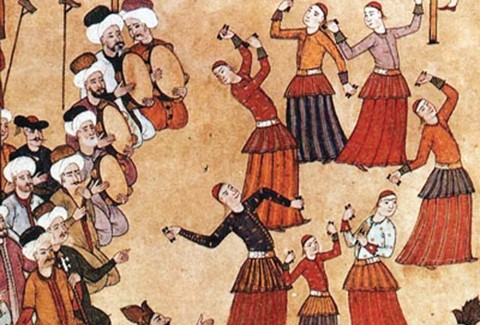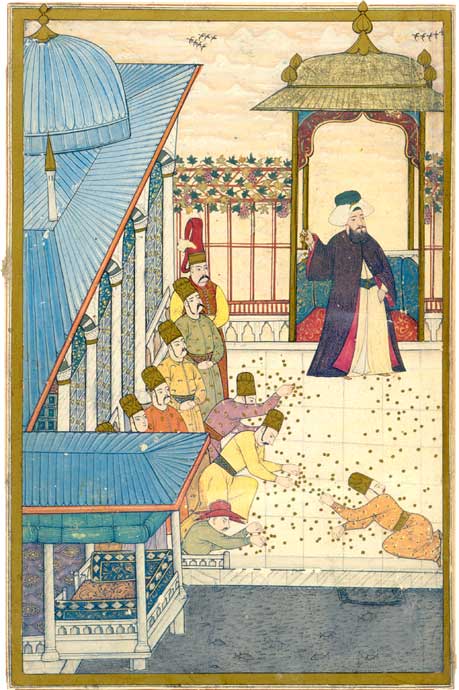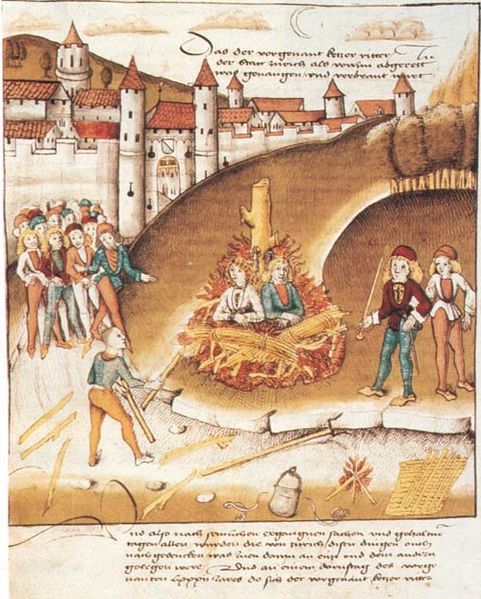
OTTOMAN PENAL CODE AND HOMOSEXUALITY
There is a map circulating on social media showing the dates when homosexual relations ceased to be considered a crime in countries worldwide, and 1858 is marked over Türkiye, which is the year the Imperial Ottoman Penal Code (Qanun al-jaza) was enacted.
According to this map, Türkiye appears to be the first country to decriminalize this matter. However, it is evident that the intention of those who share this is not to portray the Ottoman Empire as progressive and democratic, but rather to cast doubt on its reputation.
Illegitimate Tendency
First of all, the crime is not homosexuality itself but rather sodomy, which refers to unnatural intercourse. As long as homosexuality remains a thought or desire in a person's mind and is not acted upon, they are not legally or morally liable. The government or the court does not investigate anyone's private life. This is a significant difference from the previous European legal practice that considered being homosexual sufficient for the completion of the crime.
Similar to previous religions, in Islam, not only sodomy but also adopting the appearance and behavior of the opposite sex is prohibited. In religion, sodomy, which is viewed as an "illegitimate tendency" rather than a "natural choice," is a sin if done discreetly; however, if done openly, it is considered both a sin and a crime.
However, there has been disagreement among religious scholars about what its punishment should be. Since the law of the Ottoman Empire was based on Islamic law, there was no need for a separate legal provision for this.
What Does the Law Say?
It is not true that sodomy was decriminalized in the Penal Code of 1858, prepared by Ahmed Cevdet Pasha, the most famous Islamic jurist of the time, inspired by France.
Indeed, Article 202 states: "A person who openly commits acts contrary to modesty and shame [a person who openly commits adultery and sodomy], is sentenced to imprisonment for a period of three months to one year. A fine of one medjidie gold coin to ten medjidie gold coins may also be imposed."
Those who make inappropriate remarks to young people under the age of puberty [girls or boys], may be imprisoned for one week to one month. Those who engage in indecent touching may be imprisoned for one to three months. Those who enter places designated for women [places where women are present] dressed in women's clothing may be imprisoned for three months to one year.
[Filthy deed (fi’l shani) refers to any act that violates morality and ethics in the legal context. Generally, it is used according to the context for adultery, sodomy, and rape. Ömer Nasuhi Bilmen used it to mean sodomy in his book "Islamic Law and Dictionary of Islamic jurisprudence Terminology". In the Penal Code, which regulates crimes of rape and seduction in Articles 197-201, it is used for both adultery and sodomy.]
Same As Now
In the 1926 Turkish Penal Code, the situation is as follows. Article 419 states: "Those who openly engage in shameless behavior [committing disgraceful acts] are punished with imprisonment for fifteen days to two months, and those who engage in filthy deeds in this manner are punished with imprisonment from six months to one year and a heavy fine ranging from 100 to 500 liras." In 1936, the expression "those who engage in filthy deeds" was changed to "those who engage in sexual intercourse."
The still-effective 1930 Military Penal Code, Article 153/2, states: "For individuals engaging in unnatural intercourse with someone or causing this act willingly, military personnel are subject to expulsion from the Turkish Armed Forces, and for non-commissioned officers, a punishment of demotion is imposed."

Male Model
Some engage in a strange perception operation by attributing different meanings to the term "oğlan," which originally referred to both a virgin girl or boy in Old Anatolian Turkish; however, in contemporary usage, the term has taken on the connotation of a catamite. They ascribe literal meanings to the symbolic expressions of classical literature, portraying the admiration of those who see beauty as a manifestation of divine creation from another perspective. They describe scandalous books like "Zenanname" and "Hubanname" as if they were handbooks for society that can be encountered anytime, anywhere.
They attempt to involve some less credible poets, known for their vulgarity like Deli Birader and Enderuni Fazıl, and even some famous individuals and even sultans in their accusations. If a man befriends another man, they quickly associate it with unnatural love.
In Eastern culture, due to the unacceptability of openly describing female beauty, poets often use a "male model." A devout and sensible person, contemplating male beauty, may reflect on the manifestation of God's beautiful attributes. Moreover, since it's not permissible to have women dance at weddings, male dancers are employed in celebrations. These male dancers, known as "köçek," are not performers engaged in unnatural love affairs.
In accordance with the historical documentation practices of that time, Evliya Çelebi, who wrote down everything he heard in his famous work, portrays the moral degeneration of that era with some exaggeration. He mentions a group of young male wanderers (hîz oğlanları) who have taken up unnatural love affairs as their pursuit. However, it should be noted that such a legitimate profession has never existed. Believing in this would be akin to believing that a girl can give birth to an elephant or that a cat jumping from roof to roof can freeze in the cold.

German Fault?
Some individuals, driven by the pursuit of money and fame, and aware of the common people's interest in explicit literature, may distort the subject. However, if the goal is to break down homophobia in society, the main dynamic of Ottoman society, which is Islam, inherently commands compassion towards people. Those who involuntarily fall in love with someone unattainable or experience unconventional feelings that they cannot control are not considered sinful as long as they conceal and do not act upon them. In fact, they are praised for resisting their desires, and rewarded with blessings.
On the other hand, if the aim is to mock Ottoman society, they are mistaken in that as well. Prostitution can be found anywhere and anytime. Even during the time of the prophets, as mentioned in the Quran. Ottoman society is not an angelic realm. However, accusing the Ottomans of hypocrisy by saying, as a confused writer popular among some conservatives puts it, "a rosary in hand, a catamite at home, prayers on the tongue, and a fairground charlatan," does not align with fairness or seriousness.
The most accurate expression describing the character of Ottoman society is: "Ottoman morality is well-established." Judgments are given according to the majority. Mentioning something in sources indicates its rarity, not its prevalence. If pederasty had been a common practice, it wouldn't have attracted so much attention. It was, in fact, a rare occurrence.
In the Enderun school within the palace, intelligent, talented, and handsome young men were educated to become statesmen; they were referred to as "içoğlanı". The use of "iç" or "enderun," both of which mean "inner" in Turkish, is attributed to the school being located within the inner part of the palace. The derogatory meaning (i.e., catamite) attached to this word emerged later in slang. Here, "oğlan" means a young man without body hair. Similarly, "gulam" is used for male slaves and servants.
This term "içoğlanı" led famous historians like Hammer into the misconception that these individuals were used in disgraceful services. Ata Bey, who translated Hammer's History into Ottoman Turkish, pointed out this mistake; even the Grand Vizier of the time, Ali Pasha, criticized Hammer for these lines.
There was very strict discipline in the Enderun. A white eunuch, serving as a supervisor, would place his bed between the beds of every two youths. This is why, for centuries, no scandal was ever encountered either in the Enderun or in the Harem.
Given the custom of referring to homosexuality as "Le False d'Allemand" (German Fault), it is not surprising that a German like Hammer would interpret it in such a way.
Önceki Yazılar
-
THE WATER OF IMMORTALITY IN THE “LAND OF DARKNESS”28.01.2026
-
THE WORLD LEARNED WHAT FORBEARANCE IS FROM SULTAN MEHMED II21.01.2026
-
THE RUSH FOR GOLD14.01.2026
-
TRACES OF ISLAM IN CONSTANTINOPOLIS7.01.2026
-
WHO CAN FORGIVE THE KILLER?31.12.2025
-
WHEN WAS PROPHET ISA (JESUS) BORN?24.12.2025
-
IF SULTAN MEHMED II HE HAD CONQUERED ROME…17.12.2025
-
VIENNA NEVER FORGOT THE TURKS10.12.2025
-
THE FIRST UNIVERSITY IN THE WORLD WAS FOUNDED BY MUSLIMS3.12.2025
-
WHO BETRAYED PROPHET ISA (JESUS)?26.11.2025